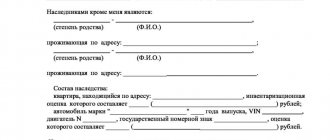Legislative framework for loans of the deceased
Entry into inheritance occurs within 6 months from the date of death of the testator (Article 1154 of the Civil Code of the Russian Federation). The rule applies to applicants of the 1st line of kinship. For other heirs, other deadlines are provided.
During this time, a person must submit an application to a notary or perform the necessary actions that confirm the actual acceptance of the property. After six months, citizens receive their due shares of the inheritance and the debt obligations of the testator. If there are two or three heirs, then they are jointly and severally liable to creditors (Article 1175 of the Civil Code of the Russian Federation).
On a note! Obligations for debts to creditors arise for the heirs only six months after the opening of the inheritance (death of the debtor). Until they receive a certificate and register ownership, they are not the owners of the property.
Paying off debt on a secured loan
If the borrower took out a secured loan during his lifetime, the lender will demand repayment of the money by selling the property. The heirs have three options.
- It will be possible to obtain ownership of the property only after the debt of the deceased borrower is paid off. The loan repayment schedule will be revised.
- If no one claims the property, the bank will put the property up for auction and take all the money.
- When the heirs do not have the money to pay off the debts of the deceased, they may agree to the bank's terms. The creditor puts the property up for auction, takes part of the money for himself, and the rest is equally distributed among the heirs.
Read the article “How to properly refuse a loan received?”
Non-inheritable debts
According to the law, not all debts are inherited by the relatives of the deceased. The inheritance does not include the rights and obligations of the testator, which are inextricably linked with his personality (Article 1112 of the Civil Code of the Russian Federation). These include:
- right to alimony;
- compensation for damage to health;
- administrative fines.
Obligations of this kind are canceled immediately after the death of the testator. But the rest of the debts are inherited. For example, utility bills, debt (loan) of a deceased relative, or unpaid taxes (Article 44 of the Tax Code of the Russian Federation).
Transfer of credit by inheritance
In accordance with Article 1175 of the Civil Code of the Russian Federation, the loan is inherited when the heir takes ownership of the property of the deceased. The testator will pay the debts of the deceased borrower in accordance with the share of the inherited property.
Until the heir takes ownership of the inheritance, the bank does not charge penalties, fines and interest.
Debts are inherited in the following cases:
- the successor received the inheritance six months after the death of the borrower;
- the deceased borrower did not take out life insurance;
- the testator received valuables, jewelry, vehicles, and property at his disposal.
The obligations of the deceased that concerned him personally cease to apply after death. For example, alimony and traffic police fines.
Is it possible to refuse to pay debts on a deceased person’s loan?
This is permitted if the heir refuses the property. In this case, you do not need to pay anything. But you have the right to contact the creditor and ask for debt restructuring or refinancing. Credit companies are willing to make such deals because they understand that they can lose money and no one will pay off their debts.
Do relatives pay debts for the deceased?
The law does not separate the property rights and obligations of the testator. If the legal successors accept the inheritance, then the loans of the deceased person automatically pass to them. Citizens cannot accept part of the property and refuse the rest of the property. The inheritance is accepted at a time and in full (Article 1152 of the Civil Code of the Russian Federation).
The only way to avoid paying off someone else's debts is to renounce an inheritance. The refusal may be targeted or absolute. Methods of refusal - by default or by submitting an application to a notary (Article 1159 of the Civil Code of the Russian Federation).
On a note! Successors are liable to creditors solely within the limits of the value of the inherited property.
You can draw up documents to repay the loan debt of a deceased person after the expiration of the 6-month period. Until this time, the heirs are not the owners of the property, and therefore have no legal relation to the debts of the deceased.
The issue of debt repayment during the period of registration of inheritance remains at the discretion of the heirs. The lender has no right to demand early closure of the loan. However, it is advisable for the heirs to notify the lender of the death of the borrower. This will avoid the accrual of fines and penalties for late payments on the loan.
Lawyers recommend that heirs take the following steps:
- find a loan agreement and find out the amount of debt;
- make a request to BKI. The procedure for resolving the issue legally is carried out through a notary. Therefore, legal successors will first have to submit an application for opening of inheritance. Contacting the Bureau will allow you to find out about available loans and the organizations in which they were issued;
- send to the bank a notarized copy of the death certificate and a certificate from the morgue.
If necessary, successors can agree with the creditor to repay the loan before the actual entry into inheritance rights.
Limitation periods
The general limitation period is 3 years (Article 196 of the Civil Code of the Russian Federation). The countdown begins from the moment the creditor learned of the violation of his rights and the identity of the defendant in the claim.
The statute of limitations for the claims of the testator's creditors is not interrupted, canceled or suspended. Consequently, the lender can make a claim within three years from the date of arrears on the deceased’s loan, and not after the death of the debtor. Reinstatement of missed deadlines is not allowed (clause 59 of the Resolution of the Plenum of the Armed Forces of the Russian Federation dated May 29, 2012 No. 9).
Heirs also need to take into account the clarifications of the Supreme Court:
- The death of the debtor is not grounds for early repayment of the loan. For example, if the borrower had no delays, then the heirs can continue to repay the loan in accordance with the agreement;
- the amount of the loan issued to the borrower for personal or family needs can be returned by the heirs ahead of schedule. However, you must notify the bank about depositing money at least 30 days before the payment date, unless the agreement specifies a shorter period.
How to check for debts before accepting an inheritance?
Previously, checking debt was so difficult that most heirs preferred to take a risk and check the debt obligations of a deceased relative upon receipt of the inheritance. But since 2014, when amendments were made to Federal Law No. 218 “On Credit Histories” dated December 30, 2004, everything has changed.
According to paragraph 6 of Art. 6 of Law No. 218, notaries involved in inheritance matters now have the right to contact the National Bureau of Credit History to obtain an extract. This is how the hereditary mass of the deceased is checked. NBKI is obliged to provide the notary with an extract within 3 working days from the date of application.
So, to check the existence of debts, you just need to ask a notary to check the information in the NBKI. In the vast majority of cases, he will do this himself without your requests, but this does not always happen - it would not be a bad idea to play it safe. This way you will receive sufficient information about the debt burden of the testator, based on which you will be able to determine whether it is worth entering into inheritance or not.
Cases of inheritance of a loan by an insurance company
Many banks issue loans for the purchase of a car or apartment, provided that insurance is taken out. Having a policy is a guarantee of money back in the event of a person’s death. However, insurers do not always cover losses. A complete list of insurance risks is contained in the contract.
Insurance case
The heir needs to carefully study the provisions of the insurance policy. The document must contain an exhaustive list of cases covered by insurance. For example, the death of the insured person from illness, accident or illegal actions of third parties. If there are grounds, you should immediately contact the insurer.
What should an heir do when insuring a loan?
If the insurance policy has not expired at the time of the testator’s death, then the heirs need to prepare documents and submit an application for payment to the insurance company. The package of documents for obtaining insurance depends on the selected organization. Details can be found on the insurer's website.
If the decision on the application is positive, the insurance company will transfer the amount specified in the agreement to the bank to repay the loan.
What if the heirs do not know about the existence of an insurance policy? Legal successors can study the loan agreement or make a request to the BKI. This will allow you to find out where the testator took the money. Then you can make a request to the bank about all the companies with which it works or contact all insurance organizations in the city.
Possible exemption from insurance obligations
The insurer is released from obligations under the contract in the following cases:
- suicide;
- a chronic disease that was diagnosed before the policy was issued;
- death during extreme sports;
- death in prison;
- death as a result of hostilities;
- death due to a nuclear accident;
- the insurance has expired.
A complete list of exclusions from insured events is contained in the policy.
Only the heir or beneficiary specified in the contract can apply for payment of insurance compensation.
What debts are not transferable?
Contrary to popular belief, the testator does not transfer all debts upon his death. In Russian jurisprudence, there is a separate concept of “inalienable debts,” which denotes those obligations that relate only to the person himself. They, by virtue of their definition, cannot be inherited. For example, such obligations include the following categories of debt:
- Alimony;
- Material compensation for damage caused to the health and property of third parties;
- Debts to third parties that do not have any documentary evidence (agreement, receipt, receipt);
- Material compensation for moral damage caused;
- Penalties under agreements - if this agreement is not a loan agreement;
- Other debt obligations related only to the debtor himself, but not to the heirs.
What to do if the creditor asks to urgently repay the loan of the deceased
The bank may require you to repay the loan early. The lender usually refers to the long period of delay and accrued fines. However, such demands are unlawful.
The heir may provide a death certificate of the borrower and not communicate with bank employees until he assumes inheritance rights. After registering the inheritance, you can continue to pay the loan, restructure the debt, or repay the loan early.
Do banks have the right to demand fines and penalties from heirs after registration of an inheritance? In this case, the bank’s actions will be legal. However, it is worth paying attention to the size of the penalties. It may be advisable to raise the issue of reducing the amount.
Is a car loan inherited after death?
Any debt obligations pass to family members of the deceased borrower, provided that they enter into inheritance rights. Car loans are no exception.
If you have a CASCO policy, the loan debt can be repaid using the insurance payment. If the loan was not insured at the time of the borrower's death, the heirs can accept the property and repay the loan according to the schedule or sell the car and pay off the debt. In case of refusal of inheritance, the borrower's property will go to the bank.
Who pays the debts?
If the borrower took out a long-term loan without insurance and died suddenly, the debt will be paid by the state, guarantors or heirs. When there is insurance, the debt goes to the insurance company. If the loan was issued with the involvement of a guarantor, then it is he who will pay the debts after the death of the borrower. Upon entering into an inheritance, the successor is obliged to repay the debt to the bank.
When the deceased does not have guarantors and heirs, and no insurance policy has been issued, the property of such a borrower acquires the status of escheat. This means that all rights to property, including debts, pass to the state. The property of the deceased borrower is put up for sale, part of the proceeds goes to pay off the debt, the other goes to the state. If the debt exceeds the value of the property, the creditor receives only part of the money.
How to avoid paying fines and interest after the death of the borrower
You cannot avoid paying interest on a loan. But you can reduce the size of the penalty (Article 333 of the Civil Code of the Russian Federation). The heir will have to go to court and prove that the amount of the accrued penalty is not commensurate with the consequences of violating the obligations under the contract.
Penalties can be avoided by promptly notifying the creditor of the death of the testator.
If desired, the successor may refuse to accept the inheritance. In this case, the obligations of the deceased will not pass to him.
How does collection work?
Almost always, collection is carried out through litigation and, later, enforcement proceedings. However, it is not always possible to involve bailiffs.
The judge, based on the results of the litigation, determines how much each heir must pay to creditors. However, he does not approve the payment procedure. This means that, for example, when inheriting an apartment and debts, the heirs will not be obliged to sell the home in favor of the debt - if they wish, they will be able to pay off the debt with their own money.
But lenders are different. Some of them require the court to secure the loan. In this case, the apartment is seized - it can neither be sold, nor given as a gift to anyone, nor exchanged for other housing. In case of failure to fulfill obligations to the creditor (within the time period established by the judge's decision), the housing is transferred to his favor.
Can banks transfer debt to collectors?
Any bank has the right to transfer a person’s debts to third parties, including a collection agency. This occurs by concluding an assignment agreement (Article 382 of the Civil Code of the Russian Federation). The possibility of assigning the right of claim is usually specified in the loan agreement. The debtor's consent to transfer the creditor's rights to third parties is not required.
The only condition is that the new lender must have a banking license. Otherwise, the debtor’s consent will be required to transfer the creditor’s rights to another person. (Determination of the Supreme Court of the Russian Federation dated May 14, 2019 in case No. 67-KG19-2).
If the loan agreement does not contain such a clause, then the lender does not have the right to assign the borrower’s debt to third parties without his consent.
How not to repay a debt
The only way to avoid paying off someone else's debts is to refuse an inheritance. It is advisable for heirs to renounce property rights if the amount of debt exceeds the value of the identified property. However, the heir will no longer be able to change his decision. The notarial refusal is irrevocable.
If the loan debt is small, then it is appropriate to enter into inheritance rights and close it. You can estimate the approximate value of an asset yourself or by contacting an appraisal company. For example, if you need to find out the value of a property, business or copyright.
In case of refusal to accept the inheritance, citizens will not be able to freely use the apartment. The debt will be repaid using the identified property. The relatives of the deceased person will have to leave the apartment. The exceptions are young children and disabled parents. The lender has no right to evict them. However, it is necessary to take into account the circumstances of the case (Determination of the Armed Forces of the Russian Federation dated 06.08.2013 No. 24-KG13-4).
How to accept an inheritance with debts and avoid problems
The estate of the deceased includes the property of the deceased, his rights and obligations. Thus, loan debts are also an inheritance. This means that the debtor’s heirs will be liable for them. If there are several of them, then the amount of debt is divided in proportion to their share in the inheritance. Each relative receives from a notary a certificate of his right to inheritance.
To receive an inheritance, a citizen must accept it - emphasizes the first paragraph of Art. 1152 of the Civil Code of the Russian Federation. Until the heir has accepted the inheritance, he is not liable for the debts of the deceased.
The notary is responsible for the procedure for entering into inheritance. The lawyer also notifies creditors of the debtor's death. However, before entering into an inheritance, it makes sense for a citizen to visit the financial organization of which the deceased was a client. The heir will be able to clarify the details of the loan agreement, find out about the debt and discuss further actions on the loan: perhaps it can be refinanced or restructured. But it’s not worth re-issuing a loan to yourself. The bank may arrange it for you on other, less favorable terms.
Deposit “Valuable asset smart” Renaissance Life, Persons. No. 3354
to 10%
per annum
from 100 thousand
91 days
Make a contribution
If you wish, you can initiate bankruptcy proceedings for the deceased. This procedure is no different from bankruptcy of an individual. In this case, to pay off the debt of the deceased, his property is sold. Thus, the inheritance mass will decrease in proportion to the amount of debt.
Bankiros.ru
If there are several heirs, they need to agree in advance on the order and amount in which they will make payments. Such an agreement can be oral or notarized. It will help you avoid both underpayment and overpayment on the loan.
Heirs do not have to pay more on the loan than the amount they inherited. If the debt is equal to a million rubles, and you inherited property worth 250 thousand rubles, then you only need to pay this inherited amount. If the deceased had only debts and no assets, you are not required to pay anything.
Obligations of guarantors and co-borrowers
When concluding a loan agreement, banks often involve co-borrowers and guarantors. They are jointly and severally liable for their obligations. For example, in case of default on a loan or death of the main debtor. The extent of liability is determined by the contract. Typically this includes repayment of the loan amount and accrued interest.
The debtor's spouse often acts as a co-borrower. The guarantor may be a third party. Repayment of the loan debt is carried out at the expense of the above-mentioned persons or through the sale of property.
The most difficult circumstances arise for unsecured loans. The inheritance goes to the relatives of the deceased person, and the loan debts will have to be repaid by the co-borrower and the guarantor. However, if the co-borrower is the spouse of the deceased, then he can pay off the debt using his share of the inheritance.
On a note! The guarantor has the right to present a counterclaim to the inheritance after paying off his part of the loan (Article 365 of the Civil Code of the Russian Federation). If the legal successors refuse to compensate for the losses of the guarantor, he may go to court.
Additional questions
No. 1. How long does it take to accept an inheritance?
You can submit an application to a notary or take actions indicating the actual acceptance of the inheritance within 6 months from the date of death of the testator.
No. 2. When is it appropriate to refuse to accept an inheritance?
It is advisable to waive the rights and obligations of the testator if the identified property does not cover the debt obligations of the deceased. In other cases, it is worth taking over, selling the property, closing debts and taking the remaining funds.
No. 3. Is it possible to accept only part of the inheritance?
The law does not allow such manipulations. The successor must accept the inheritance at a time and in full.
No. 4. How to avoid paying a loan for a deceased relative?
If a relative accepts the inheritance, then the debts of the testator also pass to him. The only way to get rid of them is to refuse the inheritance. As for the amount of debt, it can be reduced through negotiations with the creditor and in court.
No. 5. Should relatives and heirs pay off the loan of a deceased person if he died on the last day of the insurance coverage?
If the insured event does not fall into the “Exceptions” category, then the insurer is obliged to pay compensation. That is, the heirs will not need to repay the loan. The insurance period usually ends at 24:00 on the date specified in the contract.
No. 6. Is it possible to revoke a refusal of inheritance?
If a refusal application has been submitted to a notary, then it can no longer be withdrawn.
When is an heir obligated to pay a loan for the deceased?
The relatives of the deceased will not pay the deceased's loan if they refuse the inheritance. But if close people own valuable things of the deceased and use his money, the creditor has the right to demand repayment of the debt. When the heirs receive the money, property or vehicle of the deceased, they are liable to the bank. And if they refuse to comply with the bank’s demands, the creditor has the right to file a lawsuit and win the case.
For example, the borrower was married and took out a loan for 1 million rubles. But he died suddenly. He owned an apartment and a bank deposit. The wife withdrew the money, but refused to pay for her husband's debts. In this case, the creditor will sue and collect the balance of the debt, including penalties under the contract.









